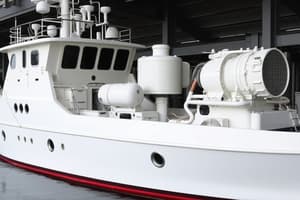Podcast
Questions and Answers
Define gross tonnage and net tonnage in relation to a vessel's size.
Define gross tonnage and net tonnage in relation to a vessel's size.
Gross tonnage refers to the total internal volume of a ship, while net tonnage refers to the volume available for cargo and passengers after deducting non-revenue spaces.
Explain what is meant by lightweight and deadweight in the context of a vessel.
Explain what is meant by lightweight and deadweight in the context of a vessel.
Lightweight is the weight of the ship when it is completely empty, while deadweight is the maximum weight of cargo, fuel, water, and stores that a ship can carry.
Define displacement in relation to a vessel's size.
Define displacement in relation to a vessel's size.
Displacement is the weight of the water displaced by a ship, which equals the total weight of the ship.
Explain the relationship between Lightweight, Deadweight, and Displacement of a vessel.
Explain the relationship between Lightweight, Deadweight, and Displacement of a vessel.
How does knowing the gross tonnage and net tonnage help in assessing a ship's capacity?
How does knowing the gross tonnage and net tonnage help in assessing a ship's capacity?
Flashcards are hidden until you start studying
Study Notes
Gross Tonnage and Net Tonnage
- Gross Tonnage (GT): Represents the total internal volume of a vessel, including all spaces, often used to assess the size of a ship for regulatory purposes.
- Net Tonnage (NT): Calculated by deducting the volume of spaces not used for cargo from the gross tonnage, providing a measure of the ship's cargo-carrying capacity.
Lightweight and Deadweight
- Lightweight (LWT): The weight of the ship excluding cargo, fuel, water, and crew, essentially the ship's empty weight.
- Deadweight (DWT): The maximum weight a vessel can safely carry, calculated as the total weight of cargo, fuel, water, crew, and provisions that the ship can hold without compromising safety.
Displacement
- Displacement: Refers to the weight of water displaced by the vessel when it is afloat, equal to the total weight of the ship including cargo, indicating its overall size and capacity.
Relationship among Lightweight, Deadweight, and Displacement
- Displacement is the total weight of the vessel plus all loaded items, making it equal to lightweight plus deadweight.
- This relationship is critical for ensuring vessels remain within safe operational parameters.
Importance of Gross and Net Tonnage
- Knowing gross tonnage helps in assessing the vessel's overall size for port fees, regulations, and safety requirements.
- Net tonnage provides an understanding of the actual cargo-carrying ability, which is vital for commercial shipping and logistics planning.
Studying That Suits You
Use AI to generate personalized quizzes and flashcards to suit your learning preferences.




